七年级下>Module 2 What can you do ?>Unit 1 I can play the piano
文档属性
| 名称 | 七年级下>Module 2 What can you do ?>Unit 1 I can play the piano | 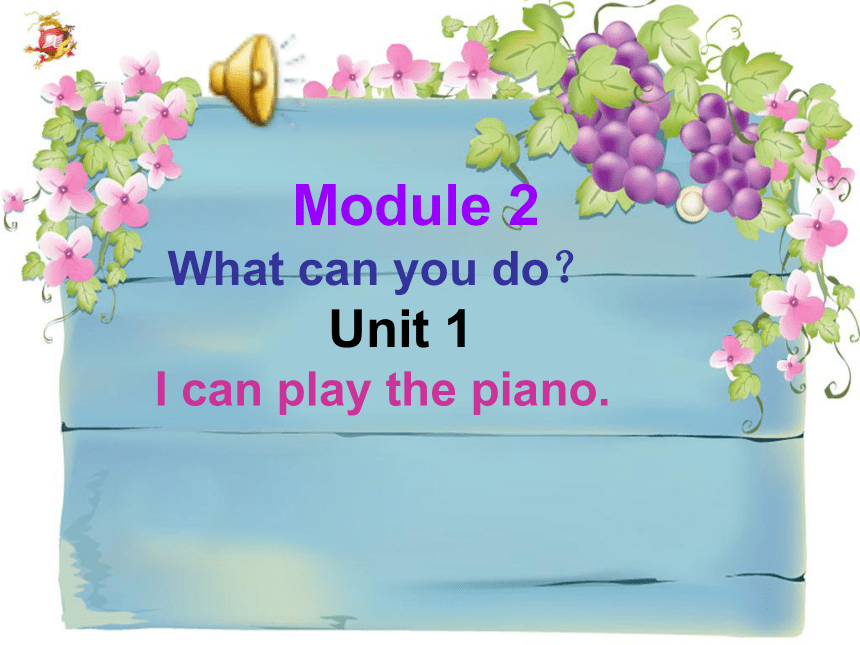 | |
| 格式 | zip | ||
| 文件大小 | 2.3MB | ||
| 资源类型 | 教案 | ||
| 版本资源 | 外研版 | ||
| 科目 | 英语 | ||
| 更新时间 | 2013-03-07 08:34:31 | ||
图片预览


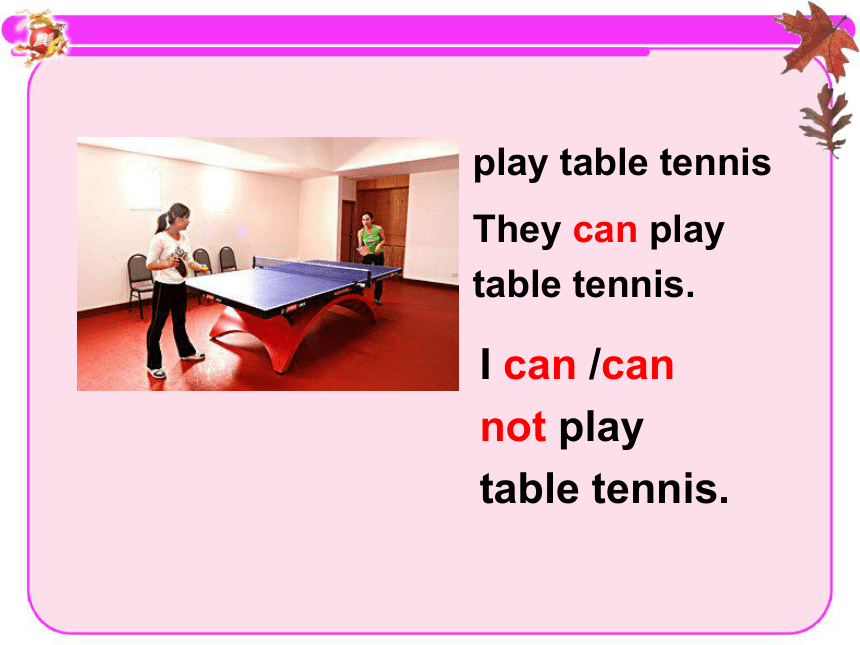
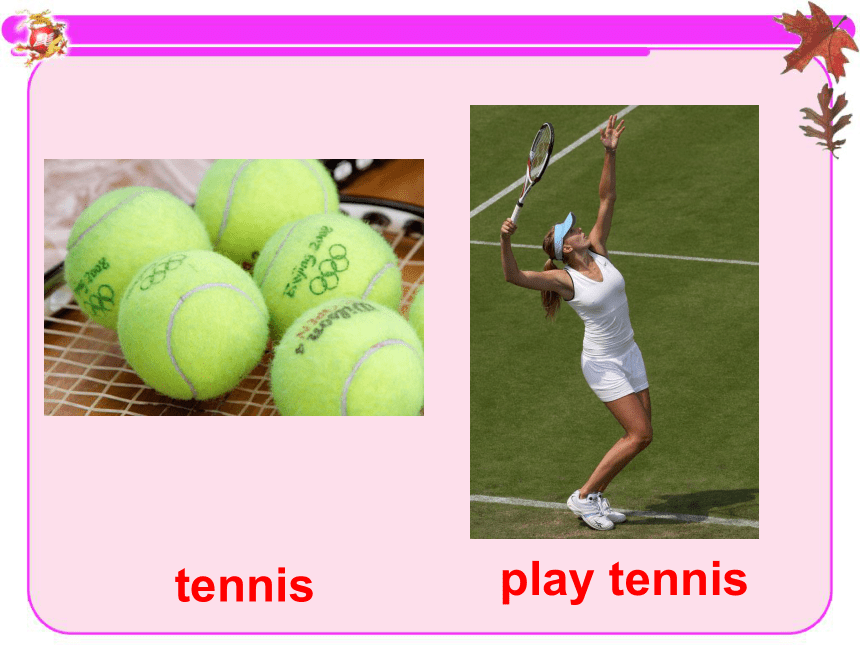

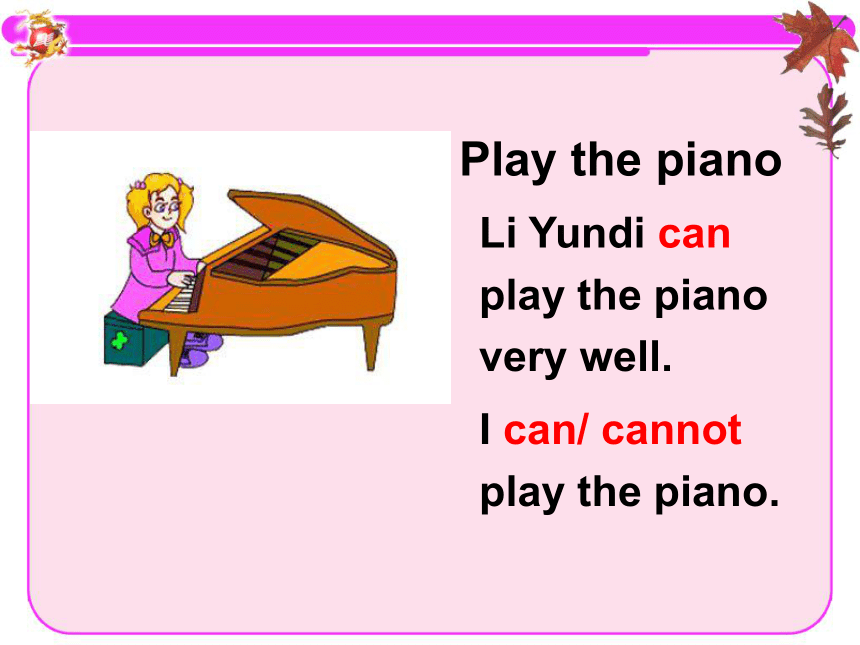





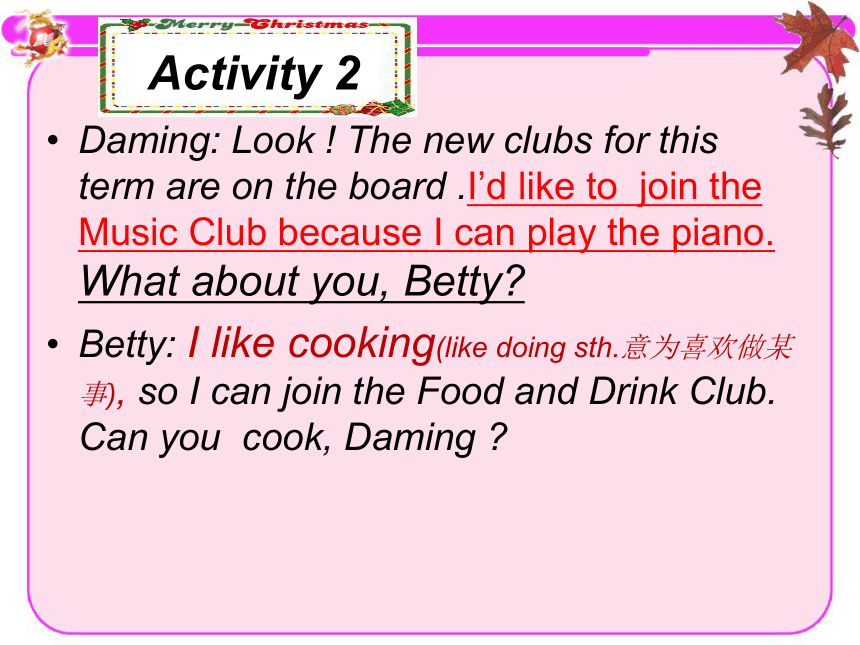
文档简介
课件35张PPT。 Module 2
What can you do?
Unit 1
I can play the piano.To understand conversations about sports
To process information of sports in the listening
To ask and give information about what kind of sport one can do
Key structures — can, can’tTeaching aims and demandsplay table tennisThey can play table tennis.I can /can not play table tennis.tennisplay tennisplay table tennisZhang Yining can play table tennis.I can / can’t play table tennis.Can she play table tennis?Yes, she can.Play the pianoLi Yundi can play the piano very well.I can/ cannot play the piano.cookHe can cook. I can/ cannot cook.Can you cook?Yes, I can. / No, I can’t.danceCan you …?Can they dance?Yes, they can. / No, they can’t.They can speak Chinese.
I can/can’t speak Chinese.ride a bike
It can ride a bike.
Can it ride a bike?
Yes ,it can./No, it can’t.Cook dance play table tennis play the piano ride a bike sing speak Chinese Activity 1Match the words with the pictures.“ride” 是骑的意思。骑自行车:ride a bike 骑马:ride a horse.
我经常骑自行车去西安。
I often ride a bike to Xian.= I often go to Xian by bike.Daming: Look ! The new clubs for this term are on the board .I’d like to join the Music Club because I can play the piano. What about you, Betty?
Betty: I like cooking(like doing sth.意为喜欢做某事), so I can join the Food and Drink Club. Can you cook, Daming ? Activity 23. “play”是“玩……”或“打……”的意思. play后面跟球类不用加the.
但后面跟乐器就要加the.
play football.play tennis play basketball.
play the piano.play the guitar.
4. Welcome (sb. ) to … 欢迎 (某人) 来到……
欢迎你们来我们的城市. Welcome you to our city.情态动词 can +动词原形。肯定形式:
can 否定形式:can’t 疑问形式直接把can
提到句子前面。
would like to do sth. 想做某事
Would you like to attend China Got Talent?(中国达人秀)
But I’m busy revising for my test.
Don’t mentiong it B. I’d love to
C. That’s all right D. My pleasure中考链接1、join表示“参加;加入”,侧重指身份的变化,成为某党派、团体、人群等中的一个成员,相当于become a member of.
He joined a tennis club.他加入了一家网球俱乐部。
2、take part in表示“参加;加入”,指参加某一活动并在其中起积极作用。
I took part in the game.我参加了这场比赛。What about + 名词/动名词?(=How about+名词/动名词)意为“……怎么样?”,常用于提出建议或意见。
--What about a test?
--OK! Let’s go out and have a walk.
A. to take B. takes C. taking中考链接Daming: No, I can’t. Well, I can cook eggs, but that ‘s all. What about Lingling? Which club can she join?
Betty:I think she ‘d like to join the Dancing Club because she can dance really well .Tony ,how about you? I think…句式在变否定句型时,要否定think
I don’t think she is a good student.
我认为她不是一个好学生。
I don’t sleep at night. I often feel tired.
A. well B. nice C. fine D. good中考链接中考链接 smoke here, Dad.
A. Don’t be B. Don’t
C. Not to be D. Be notTony: I’d like to join the Chinese Club. I can’t speak Chinese very well.
Daming: Don’t worry about Chinese. (此句为祈使句,祈使句的否定句形式是在动词前加don’t.worry about意为“担心”)We can teach you Chinese! So choose your favourite club. Tony: OK then .I play table tennis, so I choose the Table Tennis Club. That’s my favourite!
Worry about +sth/sb 担心某事/某人
Don’t worry!别担心
teach sb. a lesson教训某人,给某人一个教训
teach oneself 自学
teach sb. to do sth. 交某人做某事
Activity 4Can you cook ? No? Join the Food and Drink ____. Can you play the piano? Join the ____ Club. What about dancing? ___the Dance Club. There are lots of clubs every ____. They’re all on the ____ and you can choose your favourite.ClubmusicJointermboardListen and repeat. I can play the piano.
I can’t speak Chinese very well .
Can you cook?Activity 5Look at the information. Ask and answer.— Can Betty speak English?— Yes, She can.— Can Tony swim? — No, he can’t.Activity 7Work in pairs. Ask and answer. Find out what your friend can do.— Can you ride a bike?
— Yes, I can. /No, I can’t.Activity 7 “无所不能”的can
“公正无私,一视同仁”
我属于情态动词一族,无论主语是第几人称,是单数还是复数,我均“一视同仁”,没有人称和数的变化。并且无论什么动词,只要见了我,都得用原形。如:I can play football. 我会踢足球。He can ride a bike. 他会骑自行车。They can swim. 他们会游泳。
“内涵丰富,用法多样”
1.?表示能力 (如体力和脑力方面),意为“能;会”等。如:I can speak English. 我会说英语。Can?you?play?the?piano??你会弹钢琴吗?
2.?表示请求或允许,多用在口语中,意为“可以;能”等。用于疑问句表示提出要求;用于否定句表示不允许。如:Can?I?help?you??我能帮助你吗?You?can’t?smoke here.?你不能在这儿吸烟。“功能强大,变换灵活”
1. 在变否定句时,直接在我后面加上“not”,可缩写为can’t。如:He?can?sing English songs.?→?He?can’t?sing English songs.
2.?在变一般疑问句时,直接把我移到主语前 (原主语的首字母改成小写,第一人称应变为第二人称) 即可。如:I?can?see?an?apple?on?the?table.?→?Can?you?see?an?apple?on?the?table?
3. 我开头的一般疑问句,回答很容易。肯定回答为:Yes, 主语 + can. 否定回答为:No, 主语 + can’t. 如:— Can?I?see?your?new pen??我能看看你的新钢笔吗?— Yes, you can. / No, you can’t.?是的,可以。/ 不,你不能。 [温馨提示]?我与may都可以表示“许可”。在征求对方意见时用may较多。如:May?I?go?now??现在我可以走吗?在询问客观上是否可以时,我则当仁不让。如:Can?we?take?the?books?out??我们能把这些书拿出去吗?在两者都可以用时,may显得更客气一些。Exercises:一. 句型转换.
1. Can you play chess? (否定回答)
____________________.
2. They can speak English? (变为否定句)
They ______ ______ English.
3. Tom can play football. (对画线部分提问)
________ can Tom _______?
4. He can go now. (一般疑问句,否定回答)
_______ he _______ now? No, he _______.No, I can’tcan’t speakWhatdoCangocan’t二. 翻译句子:
1. 她会说日语吗?是的,她会。
2. 他可以弹吉他。
3. 欢迎小明来到我们学校。
Can she speak Japanese? Yes, she can.He can play the guitar.Welcome Xiaoming to our school.4. 我可以踢足球和打乒乓球.
5. 他们不能弹钢琴和骑马.
I can play football and table tennis.They can’t play the piano or ride a horse.Homework :1.Do Exercises 1-4 and Exercises 6-7 in your workbook.
2.Read Part 3 and recite the
passage.
What can you do?
Unit 1
I can play the piano.To understand conversations about sports
To process information of sports in the listening
To ask and give information about what kind of sport one can do
Key structures — can, can’tTeaching aims and demandsplay table tennisThey can play table tennis.I can /can not play table tennis.tennisplay tennisplay table tennisZhang Yining can play table tennis.I can / can’t play table tennis.Can she play table tennis?Yes, she can.Play the pianoLi Yundi can play the piano very well.I can/ cannot play the piano.cookHe can cook. I can/ cannot cook.Can you cook?Yes, I can. / No, I can’t.danceCan you …?Can they dance?Yes, they can. / No, they can’t.They can speak Chinese.
I can/can’t speak Chinese.ride a bike
It can ride a bike.
Can it ride a bike?
Yes ,it can./No, it can’t.Cook dance play table tennis play the piano ride a bike sing speak Chinese Activity 1Match the words with the pictures.“ride” 是骑的意思。骑自行车:ride a bike 骑马:ride a horse.
我经常骑自行车去西安。
I often ride a bike to Xian.= I often go to Xian by bike.Daming: Look ! The new clubs for this term are on the board .I’d like to join the Music Club because I can play the piano. What about you, Betty?
Betty: I like cooking(like doing sth.意为喜欢做某事), so I can join the Food and Drink Club. Can you cook, Daming ? Activity 23. “play”是“玩……”或“打……”的意思. play后面跟球类不用加the.
但后面跟乐器就要加the.
play football.play tennis play basketball.
play the piano.play the guitar.
4. Welcome (sb. ) to … 欢迎 (某人) 来到……
欢迎你们来我们的城市. Welcome you to our city.情态动词 can +动词原形。肯定形式:
can 否定形式:can’t 疑问形式直接把can
提到句子前面。
would like to do sth. 想做某事
Would you like to attend China Got Talent?(中国达人秀)
But I’m busy revising for my test.
Don’t mentiong it B. I’d love to
C. That’s all right D. My pleasure中考链接1、join表示“参加;加入”,侧重指身份的变化,成为某党派、团体、人群等中的一个成员,相当于become a member of.
He joined a tennis club.他加入了一家网球俱乐部。
2、take part in表示“参加;加入”,指参加某一活动并在其中起积极作用。
I took part in the game.我参加了这场比赛。What about + 名词/动名词?(=How about+名词/动名词)意为“……怎么样?”,常用于提出建议或意见。
--What about a test?
--OK! Let’s go out and have a walk.
A. to take B. takes C. taking中考链接Daming: No, I can’t. Well, I can cook eggs, but that ‘s all. What about Lingling? Which club can she join?
Betty:I think she ‘d like to join the Dancing Club because she can dance really well .Tony ,how about you? I think…句式在变否定句型时,要否定think
I don’t think she is a good student.
我认为她不是一个好学生。
I don’t sleep at night. I often feel tired.
A. well B. nice C. fine D. good中考链接中考链接 smoke here, Dad.
A. Don’t be B. Don’t
C. Not to be D. Be notTony: I’d like to join the Chinese Club. I can’t speak Chinese very well.
Daming: Don’t worry about Chinese. (此句为祈使句,祈使句的否定句形式是在动词前加don’t.worry about意为“担心”)We can teach you Chinese! So choose your favourite club. Tony: OK then .I play table tennis, so I choose the Table Tennis Club. That’s my favourite!
Worry about +sth/sb 担心某事/某人
Don’t worry!别担心
teach sb. a lesson教训某人,给某人一个教训
teach oneself 自学
teach sb. to do sth. 交某人做某事
Activity 4Can you cook ? No? Join the Food and Drink ____. Can you play the piano? Join the ____ Club. What about dancing? ___the Dance Club. There are lots of clubs every ____. They’re all on the ____ and you can choose your favourite.ClubmusicJointermboardListen and repeat. I can play the piano.
I can’t speak Chinese very well .
Can you cook?Activity 5Look at the information. Ask and answer.— Can Betty speak English?— Yes, She can.— Can Tony swim? — No, he can’t.Activity 7Work in pairs. Ask and answer. Find out what your friend can do.— Can you ride a bike?
— Yes, I can. /No, I can’t.Activity 7 “无所不能”的can
“公正无私,一视同仁”
我属于情态动词一族,无论主语是第几人称,是单数还是复数,我均“一视同仁”,没有人称和数的变化。并且无论什么动词,只要见了我,都得用原形。如:I can play football. 我会踢足球。He can ride a bike. 他会骑自行车。They can swim. 他们会游泳。
“内涵丰富,用法多样”
1.?表示能力 (如体力和脑力方面),意为“能;会”等。如:I can speak English. 我会说英语。Can?you?play?the?piano??你会弹钢琴吗?
2.?表示请求或允许,多用在口语中,意为“可以;能”等。用于疑问句表示提出要求;用于否定句表示不允许。如:Can?I?help?you??我能帮助你吗?You?can’t?smoke here.?你不能在这儿吸烟。“功能强大,变换灵活”
1. 在变否定句时,直接在我后面加上“not”,可缩写为can’t。如:He?can?sing English songs.?→?He?can’t?sing English songs.
2.?在变一般疑问句时,直接把我移到主语前 (原主语的首字母改成小写,第一人称应变为第二人称) 即可。如:I?can?see?an?apple?on?the?table.?→?Can?you?see?an?apple?on?the?table?
3. 我开头的一般疑问句,回答很容易。肯定回答为:Yes, 主语 + can. 否定回答为:No, 主语 + can’t. 如:— Can?I?see?your?new pen??我能看看你的新钢笔吗?— Yes, you can. / No, you can’t.?是的,可以。/ 不,你不能。 [温馨提示]?我与may都可以表示“许可”。在征求对方意见时用may较多。如:May?I?go?now??现在我可以走吗?在询问客观上是否可以时,我则当仁不让。如:Can?we?take?the?books?out??我们能把这些书拿出去吗?在两者都可以用时,may显得更客气一些。Exercises:一. 句型转换.
1. Can you play chess? (否定回答)
____________________.
2. They can speak English? (变为否定句)
They ______ ______ English.
3. Tom can play football. (对画线部分提问)
________ can Tom _______?
4. He can go now. (一般疑问句,否定回答)
_______ he _______ now? No, he _______.No, I can’tcan’t speakWhatdoCangocan’t二. 翻译句子:
1. 她会说日语吗?是的,她会。
2. 他可以弹吉他。
3. 欢迎小明来到我们学校。
Can she speak Japanese? Yes, she can.He can play the guitar.Welcome Xiaoming to our school.4. 我可以踢足球和打乒乓球.
5. 他们不能弹钢琴和骑马.
I can play football and table tennis.They can’t play the piano or ride a horse.Homework :1.Do Exercises 1-4 and Exercises 6-7 in your workbook.
2.Read Part 3 and recite the
passage.
同课章节目录
- Module 1 Lost and found
- Unit 1 Whose bag is this?
- Unit 2 Are they yours?
- Unit 3 Language in use
- Module 2 What can you do ?
- Unit 1 I can play the piano
- Unit 2 I can run really fast
- Unit 3 Language in use
- Module 3 Making plans
- Unit 1 What are you going to do at the weekends?
- Unit 2 We're going to cheer the players.
- Unit 3 Language in use
- Module 4 Life in the future
- Unit 1 Everyone will study at home
- Unit 2 Every family will have a small plane.
- Unit 3 Language in use
- Module 5 Shopping
- Unit 1 What can I do for you?
- Unit 2 You can buy everything on the Internet
- Unit 3 Language in use
- Module 6 Around town
- Unit 1 Could you tell me how to get to the Nationa
- Unit 2 The London Eye is on your right.
- Unit 3 Language in use
- Revision module A
- Module 7 My past life
- Unit 1 I was born in a small village.
- Unit 2 I was born in Quincy.
- Unit 3 Language in use
- Module 8 Story time
- Unit 1 Once upon a time….
- Unit 2 Goldilocks hurried out of the house.
- Unit 3 Language in use
- Module 9 Life history
- Unit 1 He left school and began work at the age of
- Unit 2 He decided to be an actor.
- Unit 3 Language in use
- Module 10 A holiday journey
- Unit 1 What did you do?
- Unit 2 This morning we took a walk.
- Unit 3 Language in use
- Module 11 Body language
- Unit 1 They touch noses!
- Unit 2 Here are some ways to welcome them.
- Unit 3 Language in use
- Module 12 Western music
- Unit 1 It's so beautiful!
- Unit 2 Vienna is the centre of European classical
- Unit 3 Language in use
- Revision module B
